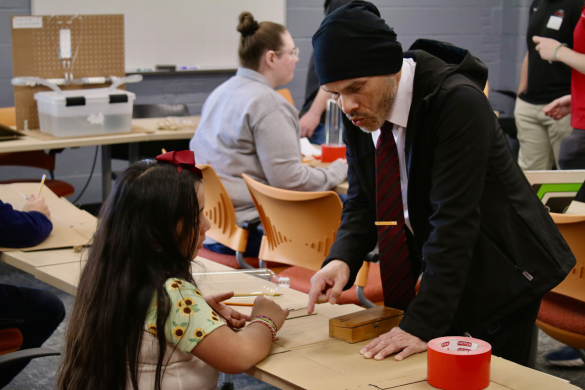Recently, Krannert School of Physical Therapy Professor Jim Bellew received the Award of Excellence from the Academy of Clinical Electrophysiology and Wound Management of the American Physical Therapy Association. This award, according to Bellew, is given to recognize an individual’s contributions in scholarly endeavors to help promote the advancement of the practice and understanding of clinical and electrophysiology.
Sciencedirect.com said: “Electrophysiology is the branch of neuroscience that explores the electrical activity of living neurons and investigates the molecular and cellular processes that govern their signaling.”
Bellew, having known and studied under others who have received the award, said he is humbled to be following their path.
“[There were] people who I considered to be legends when I was growing up in the field… To now receive an award that I know they’ve received, that’s humbling,” Bellew said. “To see that my work has been recognized as promoting and advancing the science, that was, again, humbling and rewarding.”
Bellew was nominated for the award by Assistant Professor in the Krannert School of Physical Therapy Emily Slaven. According to Slaven, Bellew deserves the award for his hard work and tenacity, in his research and engagement with students.
“He does an outstanding job teaching [physical therapy]. He does research, he does a lot of education outside… So I can’t think of anybody that would be more deserving to get national recognition amongst my peers for all he does,” Slaven said. “Some people do lots of research, but not much else. But Dr. Bellew kind of does it all.”
Bellew’s work and research began when he was hired on staff at the University of Indianapolis in 2007.
“…The true reward is being able to teach the students I have at UIndy.”
Since then, Bellew said he believes his constant and focused line of research in clinical electrophysiology, more specifically, his research in identifying optimal electrical currents and parameters for those electrical currents that are then used to activate skeletal muscle to help slow loss of strength or to increase strength, contributed greatly to receiving the award.
“It has been an area of much discussion and research for years, but there’s never been any consensus. The optimal electrical currents have yet to be identified, and my research has shown that what has previously been done for decades is certainly not optimal,” Bellew said. “We have better options available to us in terms of again choosing specific electrical currents to increase strength or prevent atrophy or prevent loss of strength.”
According to Bellew, his work never stops. His current project works with Professor Trent Cayot. The project combines Bellew’s expertise in physical therapy and Cayot’s expertise in exercise science in order to look at metabolic changes with electrical stimulation to muscle.
“To be able to bring to fruition a research study that we’re doing now has been very exciting,” Bellew said. “I already know because we have the data, but we are sitting on something new and novel that we will be reporting to the literature very soon.”
Bellew said that what he is most proud of is being able to present this information to his students. According to Bellew, he always encourages his students to be “change agents” in physical therapy, to actively seek out ways to improve the field themselves.
“I want them to find themselves in experiences where they’re seeing electrophysiology being done less optimally than we know how to do now and to use the current best evidence, much of which is my own research, to encourage clinicians and other scientists to consider modern evidence,” Bellew said. “The enjoyable part is to be able to teach this to my students, to encourage them to become change agents in the future but then the most difficult part is to find the minds that won’t open or to find the resistance to change.”
Bellew is proud and humbled to have received the award, but overall, thrilled to be able to constantly share his findings with his students.
“For me to receive an award like this is nice, but day in and day out, the true reward is being able to teach the students I have at UIndy,” Bellew said. “They are stellar students. They make what’s called a job fun [and] not feel like a job.”





